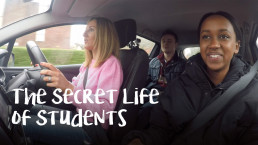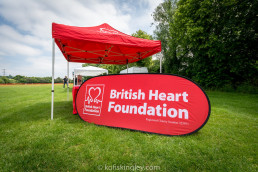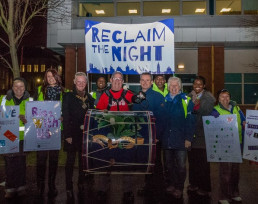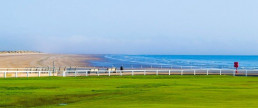Exeter's Glass Caddy Scheme
Exeter University's Student Community Wardens have been delivering the termly 'Glass Caddy Scheme' for over five years and, due to increasing demand, we are pleased that we are now trialling the scheme as a monthly service.
The Glass Caddy Scheme simply involves collecting glass from multiple student properties who do not have access to a vehicle, and delivering the glass to the closest bottle bank. This scheme was initially developed with our Students' Guild in response to the fact that Exeter does not provide doorstep glass collections. Glass was sometimes being placed in grey waste and many students without cars struggled to transport the glass to glass banks.
The service is strictly offered to students without access to a vehicle. They also use the scheme to highlight the benefits of not taking a car to the city.
Using one collection vehicle to collate multiple glass donations into one glass bank 'visit', also reduces Exeter's carbon footprint.
The surge in demand for the service has led to a monthly trial of the scheme.
We are pleased to see that this recycling trend also coincides with a significant spike in student donations of unwanted goods to charities like The British Heart Foundation for their 'Give It Don't Bin It' campaign. Increased awareness of the recycle/reuse message has been very positive and we hope to build on this success with other projects.
JAM at Queen’s awarded Andrew Lloyd Webber Foundation funding to “unlock hidden talent"
Queen’s Junior Music Academy (JAM) has been successful in the latest round of funding by the Andrew Lloyd Webber Foundation, one of Britain’s leading charities supporting the arts and music.
The Foundation has awarded £14,760 to JAM at Queen’s to fund bursaries over the next three years for a new Strings programme. Additional funding has been provided by the Music for All programme to purchase new string instruments.
A total of £225,405 has been given to arts and heritage projects in Northern Ireland, Scotland and throughout England, aimed at breaking down barriers to participation in the arts. The Foundation has prioritised projects that engage young people and individuals from hard-to-reach and minority backgrounds.
The Andrew Lloyd Webber Foundation was set up by Lord Lloyd Webber in 1992 to promote the arts, culture and heritage for the public benefit; since inception Andrew has been the principal provider of funding for all its charitable activities.
Since 2011, the Andrew Lloyd Webber Foundation has given £20.5 million in grants and performing arts scholarships, positively affecting hundreds of thousands of people across the UK and beyond. In 2018 alone, it provided financial backing and sustainability to 111 projects, totalling over £3.1 million.
To read the full article, click here.
Poppy Humphrey: the secrets of off-campus living
Poppy Humphrey was appointed off-campus student affairs officer at Manchester Student Homes, a jointly funded department of the University of Manchester and Manchester Metropolitan University in 2013. She is currently the only internationally-recognised off-campus practitioner in the UK.
At our 2018 biannual Conference held in Belfast, student communications specialists Campuslife proposed an initiative where a member of their team went back to live with a group of students in halls to find out what students really wanted from their accommodation providers. In this instance, it just made perfect sense for our off campus student affairs officer to submerse herself in living with students in an off campus environment!
And thus born was ‘The Secret Life of Students’ a series of short YouTube films designed to educate students about what to expect about life off campus.
https://www.youtube.com/watch?v=sRAW_KMToLQ&feature=emb_title
To read the full article featured on University Business, click here.
Exeter Boosts BHF Donations
A recent Impact Report from the British Heart Foundation has confirmed that University of Exeter Students have contributed significantly to charitable donations for the 2019 period.
Not only did students contribute to a record surge in charity shop donations, but the total value of bags donated in the 2019 period was £54,600, compared to £4788 the previous year.
BHF have calculated that these donations are equivalent to 31.2 Tons of items being diverted from the waste stream – this equates to 317,522 kgs of CO2 greenhouse gas emissions

This significant increase is very encouraging and demonstrates a growing environmental awareness from students seeking to re-purpose re-usable items.
“A lot of additional work was carried out by the University’s Community Liaison Team to ensure that Students departing the city in the Summer had access to donation bags and drop-off points. Work has already begun on planning for this year’s scheme and we hope to see a further increase in donations”
Rory Cunningham, Community Liaison Manager
For more information regarding the British heart Foundations campaigns, visit their website: https://www.bhf.org.uk/
Queen's and City Council Launch Belfast Climate Commission
Queen’s University Belfast and Belfast City Council have launched the Belfast Climate Commission, to drive action on the climate crisis.
The Commission will play a key role in place-based climate action necessary to achieve the UK Government’s target of reducing greenhouse gas emissions to net-zero by 2050.
Co-chaired by Queen’s University and Belfast City Council, the Commission is one of three city-based climate commissions across the UK (Belfast, Edinburgh and Leeds), funded by the Economic and Social Research Council for the Place-Based Climate Action Network (PCAN). Working alongside existing city structures and programmes, the Commission has been established to translate climate policy into action ‘on the ground’ to bring about transformative change.
The Place-based Climate Action Network (PCAN) was introduced at an event recently held at Parliament Buildings, Stormont. The network will establish Commissions in Belfast and Edinburgh, and will extend the Leeds Climate Commission, which was the first to be established in 2017. The Commissions will help the local delivery of the UK’s climate change objectives by supporting action in cities through a partnership made up of the private, public and civic sectors.
For a more in-depth analysis of the Climate Commission, please refer to Belfast City Council website or Queen's University website.
For more information on the PCAN network, please visit: https://www.cccep.ac.uk/place-based-climate-action-network-p-can/
For further information about the Belfast Energy Transition and Climate Resilience Commission, please contact Professor John Barry at j.barry@qub.ac.uk and follow @PCANcities on Twitter.
The Secret Life of Students

Many of us who work in Higher Education have interactions with students on a day-to-day basis. But how much do we really know about the complete student experience, especially living in an off-campus community?
Being able to fully understand these experiences is vital when it comes to offering Universities' off-campus services, making sure that these services are fulfilling the needs of our students. It is imperative that the institutions with a high proportion of students living off-campus can continue to promote community cohesion with the diverse communities in which our students reside.
'The Secret Life of Students' is a series of short YouTube films designed to educate students about what to expect about life off-campus. The series focuses on specific policy areas which includes student safety, housing, noise and anti-social behaviour, waste and recycling and community engagement.
The series will form part of our 'Halls 2 Home' campaign, which is delivered by Manchester Student Homes, which provides support to students before, during, and after the transition from halls of residence into their own home.
And so; with the help of CampusLife, our very own UKTGA North West representative, Poppy Humphrey, packed her bags and embarked on a week long trip down memory lane, and went back to settle in with her new student housemates!
Take a look at the trailer below!
https://youtu.be/sRAW_KMToLQ
Who are ITGA?
The International Town & Gown Association (ITGA) are a group of academic professionals that work day-to-day with issues related to Universities and their host communities across the United States Of America.
We, together with ITGA, encourage people to plan strategically and discover ways to prevent conflict and enhance the quality of life for those affected by University towns and cities.
UKTGA and ITGA are organisations that are here to assist communities in how they improve their quality of life, have positive interactions between the Institutions and the local community, and importantly, between long-term residents and students. Leaders learn how to reshape the environment to have a healthy place to live, work and play in the places they call home.
Check out this video below, explaining the role of ITGA and introducing you to a few members of the team, including a feature cameo from our Chair- Cooper Healey!
If you want to learn more about ITGA, then visit their website: https://www.itga.org/
https://www.youtube.com/watch?v=k9Yt3uVSBRc&feature=youtu.be
Reclaim the Night - Unite, join the fight, and reclaim the night!
On Monday 25 November 2019 over fifty students, staff and community members from St Andrews took part in the Students’ Association’s Reclaim the Night event. Reclaim the Night is a global movement to end sexual violence and gender-based violence.
Over the past forty years, thousands have marched to protest this violence, to support survivors, and to fight for everyone's right to safety.
This year's march was the 5th annual event held in St Andrews. Hosted by the gender equality societies of St Andrews, the event was open to all and was part of this year’s Community Relations Week activities. The night started with poster making at the Student Union followed by a march through the town. The crowds were joined by Professor Sally Mapstone, Vice-Chancellor and Principal of the University of St Andrews who spoke about her own experiences of Reclaim the Night marches from her university days.
In addition, a safe space was available for the duration of the event. The event was organised by the Feminist Society, SRC Member for Gender Equality, For Her, Got Consent, Her Choice, HeForShe St Andrews, Saints LGBT+, and Sexpression. The event was supported by Community Relations and the University.
St Andrews Town Gown View
St Andrews is a unique and captivating place, and the University is a key part of its charm. Seven centuries of history link the students with the town, leading to the ancient and yet modern institution apparent today. Founded in the early 15th century, St Andrews is Scotland’s first university and the third oldest in the English speaking world. Since its conception, the town and the institution have been inextricably woven together. Many current community members are alumni and the University is the biggest employer in the area.
The University holds a unique place within the ‘community’ of St Andrews. The University’s campus effectively stretches across the town, with many historic buildings across the town acting as offices and lecture theatres as well as student halls of residence.
On staff, a dedicated Community Engagement and Social Responsibility Officer works with colleagues to turn our social responsibility aims into reality. As well as a dedicated CESR Officer, University staff within academic, cultural and environmental designations all work with the community on various initiatives and we have an excellent Students’ Association, who work with students to ensure their time at St Andrews is both enjoyable and inspiring, whilst also being respectful and considerate to their environment and community.
Follow The Winds of Change: Action on Climate Change
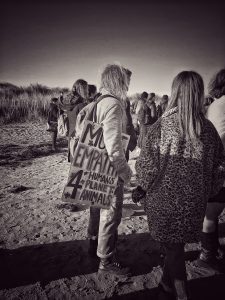 On Friday 20 September 2019, students and staff of the University of St Andrews and the wider community drew a line in the sand for climate change.
On Friday 20 September 2019, students and staff of the University of St Andrews and the wider community drew a line in the sand for climate change.
Recognising that enough is enough on Friday 29 November 2019 students, school children and citizens from Fife gathered in St Andrews at St Salvator’s Quad and then proceeded down together to West Sands beach for speeches from the political candidates and the planting of six windmills in the sand to highlight the importance of renewable energy resources.
The event called for participants to plant the seeds for a better future and follow the winds of change. What does climate action mean in St Andrews? These global climate strikes have changed the narrative of climate politics. Activism works. Solutions are needed and action is needed, and our participants stood together to call for renewable energy solutions that consider citizen voices and community concerns.



